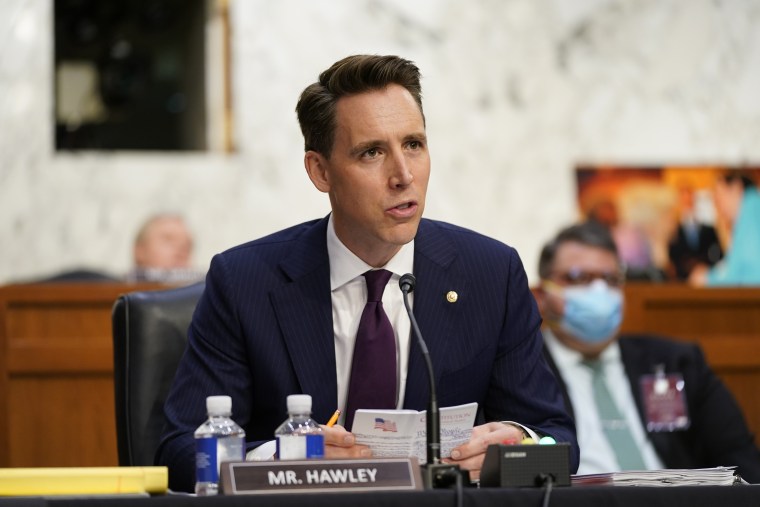There's no shortage of far-right House Republicans who've announced plans to formally contest Joe Biden's victory when Congress meets next week to certify the electoral college votes. The question has been how -- and whether -- the GOP-led Senate will respond.
To Donald Trump's great frustration, Senate Republican leaders have pleaded with their members to be responsible. Senate Majority Leader Mitch McConnell (R-Ky.) -- who goes to great lengths to avoid anything that divides his conference -- has explicitly told GOP senators that there's no point in playing games with this, and Senate Majority Whip John Thune (R-S.D.) added last week that if any of his colleagues made such an effort, it would "go down like a shot dog."
But for those eager to grandstand, and claim a far-right spotlight in advance of an expected presidential campaign, the temptation to ignore party leaders and do the dumb thing is simply too strong. Politico reported this morning:
Sen. Josh Hawley on Wednesday pledged to challenge President-elect Joe Biden's victory in Pennsylvania and possibly other states on Jan. 6, when Congress is set to certify the results of the 2020 election. The Missouri Republican's announcement guarantees that both chambers will be forced to debate the results of at least one state and vote on whether to accept Biden's victory, a process that Senate Majority Leader Mitch McConnell had urged Republicans to avoid, despite pressure from President Donald Trump, who is urging Republicans to overturn the democratic results.
In a written statement released this morning, Hawley, in his second year on Capitol Hill, suggested Republicans' baseless fraud allegations have merit and are worthy of scrutiny. Though he must be aware of the GOP scam, the Missourian said, "At the very least, Congress should investigate allegations of voter fraud and adopt measures to secure the integrity of our elections. But Congress has so far failed to act."
For those fearing some kind of Republican-orchestrated coup, let's make the end result clear: Hawley's little stunt will not have any substantive effect. It will require the Senate to debate his objection, and it will slightly delay Congress' certification of the election results, but it will not interfere with Joe Biden's presidential inauguration on Jan. 20.
But that does not mean that the Missouri Republican's gambit is meaningless. On the contrary, there are elements of this that are quite important.
It's obvious, for example, that this move will create a race to the bottom in GOP politics. There's no great mystery as to what's motivating Hawley: the senator seems to believe his party is headed in an increasingly Trumpian direction, and if he's going to be a major power player, he'll need to be seen fighting alongside Trump, lending his voice to Trump's ugliest grievances.
That, of course, means that every other ambitious Republican who's also striving for power-player status will need to follow suit, lest Hawley claim the mantle -- and impress Trump's rabid followers -- without intra-party competition.
Indeed, by way of his challenge, Hawley will force a Senate vote next week, effectively putting senators on the record, either supporting or rejecting demonstrably ridiculous anti-election lies. McConnell desperately wanted to avoid this vote, but the Missouri Republican's stunt will likely force several GOP senators into voting Trump's way, if only because they fear the more responsible course.
Because this is where the Republican Party finds itself as 2020 comes to a close: those in the GOP who expect to lead -- and avoid primary challengers -- feel pressure to participate in an attack against their own country's democracy. Hawley's mindless recklessness will only serve to encourage other Republicans to search for new ways to be even more outrageous in the hopes of impressing Trump, the party's base, conservative media outlets, prospective donors, et al.
What's more, Hawley's move will establish a new political persona for him going forward. There are some idiosyncratic voices on the sort-of left who've expressed a fondness for the Missouri senator, celebrating him as some kind of "conservative populist."
With this gambit, Hawley is lighting that reputation on fire: populists do not take active steps to undermine democracy when the people cast votes purported populists disapprove of.
The young Republican isn't just putting his ambitions over the nation's interests, he's also exposing his purported ideology as a fraud.
Postscript: In his written statement, Hawley leaned heavily on a Dems-did-this-first argument, arguing, "I will follow the same practice Democrat [sic] members of Congress have in years past and object during the certification process on January 6." (Even here, Republicans like Hawley feel the need to get the Democratic Party's name wrong on purpose.)
It's likely the public will be hearing this talking point frequently in the coming days, which makes it all the more important to acknowledge reality. In 2004 -- a race that was considerably closer than the 2020 race -- then-Sen. Barbara Boxer (D-Calif.) objected to then-President George W. Bush's narrow victory in Ohio. Hawley would apparently have people believe he's simply following in these footsteps.
But that's foolish: Boxer was not seriously contesting Bush's re-election victory; she simply claimed the spotlight for a short while, trying to draw attention to Ohio's controversial voting policies, which were genuinely a mess. Her objection was largely overlooked; John Kerry had no interest in contesting his narrow defeat; and Democrats involved in the 2004 gambit made it explicitly clear they had no intention of trying to overturn the results of the election.
In every way that matters, the scheme Trump-aligned Republicans are pursuing now is qualitatively and fundamentally different.

